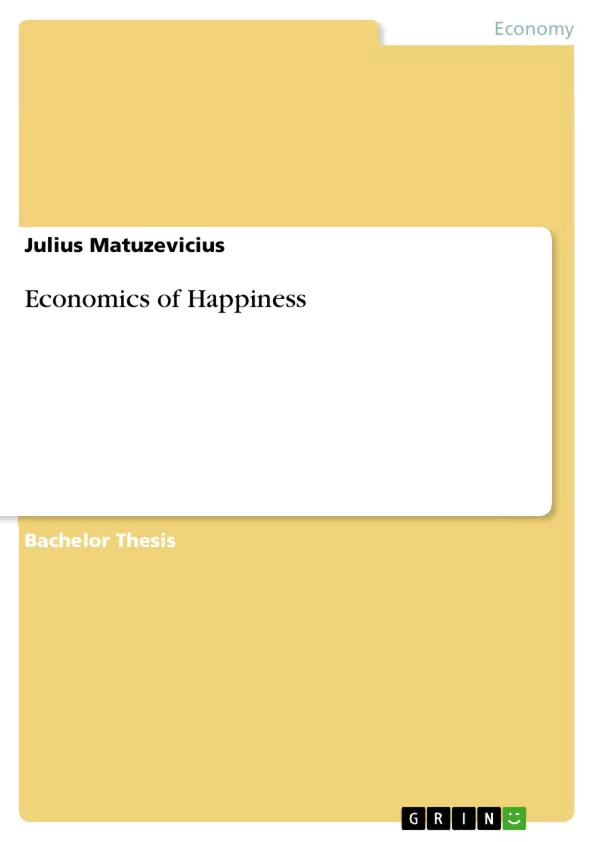The purpose of this thesis is to analyse and compare scientific research in the economics of happiness. This study field has expanded significantly over the last forty years and some wider conclusions need to be made.
This literature review looks in great detail at all concepts behind happiness and subjective well being, provides deeper understanding of GDP as a measure of welfare with issues around it and finally analyses ‘Easterlin Paradox’ and its updates.
Inhaltsverzeichnis (Table of Contents)
- Chapter 1: Introduction
- Chapter 2: Happiness
- 2.1 Terms and definitions
- 2.2 Measuring well-being
- 2.3 Issues with measuring well-being
- 2.4 Determinants of subjective well-being
- Chapter 3: Beyond GDP
- 3.1 Overview
- 3.2 Flaws of GDP
- 3.3 Defence of GDP as a measure of well-being
- Chapter 4: Easterlin Paradox revised
- 4.1 Original Easterlin Paradox
- 4.2 Hagerty and Veenhoven critique
- 4.3 Stevenson and Wolfers critique
Zielsetzung und Themenschwerpunkte (Objectives and Key Themes)
This dissertation aims to explore and analyze scientific research in the economics of happiness, a field that has expanded significantly over the past four decades. The study examines the concepts behind happiness and subjective well-being, provides a deeper understanding of GDP as a measure of welfare, and analyzes the 'Easterlin Paradox' and its updates.
- The meaning and measurement of happiness and well-being
- The limitations of GDP as a measure of welfare
- The Easterlin Paradox and its implications for economic growth and happiness
- Determinants of subjective well-being
- Alternative measures of well-being
Zusammenfassung der Kapitel (Chapter Summaries)
Chapter 1 provides an introduction to the topic of the dissertation, outlining the purpose and scope of the study. Chapter 2 delves into the definition and measurement of happiness and subjective well-being, exploring various approaches and challenges. Chapter 3 examines the limitations of GDP as a measure of welfare, discussing its flaws and alternative indicators. Chapter 4 focuses on the Easterlin Paradox, analyzing its original formulation and subsequent critiques.
Schlüsselwörter (Keywords)
Key terms and concepts explored in this dissertation include happiness, subjective well-being, GDP, Easterlin Paradox, welfare economics, determinants of happiness, and alternative measures of well-being.
Frequently Asked Questions
What is the 'Easterlin Paradox'?
It is an economic theory suggesting that while high income correlates with happiness within a country, increasing the average income of a country does not necessarily lead to an increase in average happiness over time.
Is GDP an accurate measure of human welfare?
The thesis explores the flaws of GDP as a welfare measure and discusses alternative indicators that better capture subjective well-being.
How is subjective well-being measured in economics?
Researchers use various scientific methods and indicators to quantify happiness, although the process faces several conceptual challenges.
What are the main determinants of happiness according to this research?
The study analyzes various factors beyond income, including social, psychological, and environmental determinants of well-being.
How has the field of 'Economics of Happiness' evolved?
The study field has expanded significantly over the last forty years, leading to a deeper understanding of the relationship between economic growth and personal satisfaction.
- Quote paper
- Julius Matuzevicius (Author), 2016, Economics of Happiness, Munich, GRIN Verlag, https://www.grin.com/document/345087



